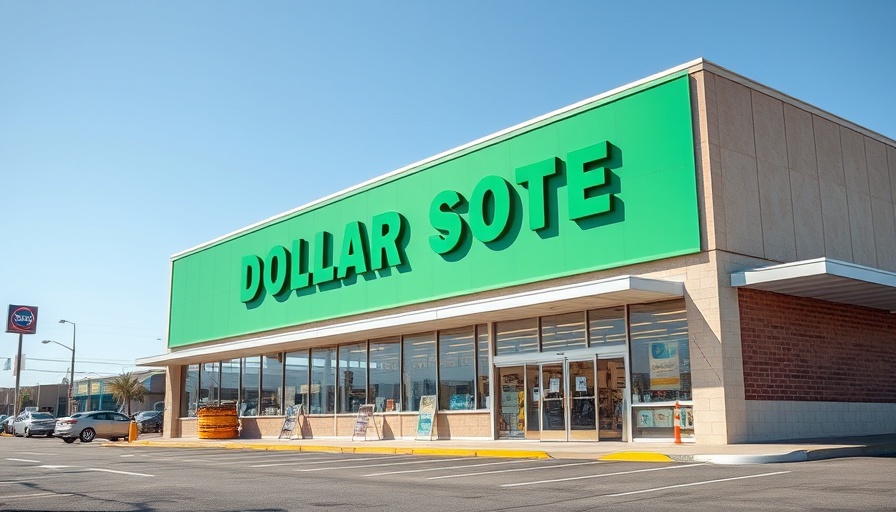
Understanding the Real Cost of Dollar Store Groceries
Dollar Tree is a familiar sight across many neighborhoods, offering shoppers the promise of low prices and convenience. However, while it may seem tempting to stock up on groceries at these stores, not all products are created equal. Savvy shoppers, especially those in New Jersey and beyond who are committed to financial wellness, should approach these aisles with caution to avoid wasting money on subpar goods. Here’s a rundown of the groceries that are best left on the shelf.
1. Low-Quality Canned Goods: More Harm Than Good
Canned goods can seem like a steal at Dollar Tree, but the truth is that many of these products come with compromised quality. Whether it’s a can of corn or soup, severe issues like off-tastes and undesirable ingredients often plague off-brand canned foods. Opting for more reputable brands, even at slightly higher prices, ensures safety and better taste, which is vital for those planning meals on a budget.
2. Frozen Foods: A Risky Investment
Frozen dinners and snacks might catch your eye with their eye-popping dollar price tag, but many fall flat in terms of taste and nutritional value. With inferior ingredients and often a short shelf life, these items are not worth the initial savings. Health-conscious shoppers aiming to boost their overall wellness should instead consider purchasing frozen vegetables or fruits from a local grocery store for better quality.
3. Expired or Near-Expired Products: Read Labels Carefully!
It’s essential to be vigilant while shopping at dollar stores. Many bulk-bought product lines can lead to older stock being sold. A savvy shopper must pay close attention to expiration dates, as buying expired items can lead to waste and unintended health risks. Your financial goals should always include making wise choices in terms of food safety.
4. Dairy Products: Consume With Caution
Milk, cheeses, and other dairy items can be found at Dollar Tree, but the quality is often questionable. Some products may not be stored at the correct temperatures, leading to spoilage. Regular grocery stores typically provide a better selection of dairy items that are fresher and safer. For those tracking expenses while balancing nutrition, investing in quality dairy is imperative.
5. Snacks and Treats: The Overlooked Ingredient List
While indulging at Dollar Tree may seem budget-friendly for snackers, many treats are packed with preservatives and artificial ingredients. Adult consumers who are focused on debt reduction and enhancing personal health should be wary of these pitfalls. Searching for healthier snack options at more reputable stores can significantly align with both financial and health goals.
6. Fruits and Vegetables: Freshness Matters
Buying fresh produce at dollar stores is often a gamble. The vegetables and fruits may lack the freshness and taste found at a regular supermarket, making them less appealing. For individuals dedicated to achieving optimal health and wellness, investing in high-quality, fresh produce is crucial. The extra few dollars spent can lead to a more satisfying meal and improved health.
Empowering Your Financial Decisions
Understanding where your food comes from and the associated costs can significantly impact your financial wellness. Choosing to prioritize quality over quantity resonates deeply with budgeting intentions, which are crucial for reaching financial goals. By spending wisely and selecting groceries that offer the best value, you can enhance your personal finances.
A Local Perspective: Dollar Tree Vs. Local Markets
For NJ residents, supporting local markets can provide not only fresher options but can also strengthen community bonds. Shopping at farmer's markets and independent local shops allows consumers to spend their money in a way that boosts the local economy while obtaining quality produce and groceries.
Conclusion: A Thoughtful Approach to Shopping
While Dollar Tree may seem appealing for its low-cost grocery items, consumers are encouraged to consider the long-term implications of their choices. Covering these grocery traps will assist you in better financial planning for everything from food to retirement savings. Remember, sometimes, the path to financial wellness starts by making informed, quality choices now.
Take charge of your financial journey today! Explore local markets, stay aware of product quality, and ensure every dollar spent aligns with your personal wellness goals.
 Add Row
Add Row  Add
Add 




Write A Comment